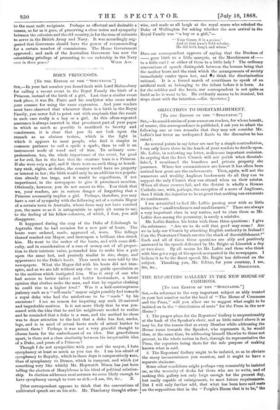BORN PRINCESSES.
[To THE EDITOR OF THE "SPECTATOR."] SIR,—In your last number you found fault with Lord Mahnesbury for calling a recent event in the Royal Family the birth of a Princess, instead of the birth of a girl. Last time a similar event took place, it was Dr. Farre and his coadjutor who came under your censure for using the same expression. And your readers must have observed that whenever there is a birth in the Royal Family, you never fail to point out with emphasis that the result in each case really is a boy or a girl. As this often-repeated assurance is always inserted in that prominent part of your paper in which as much as possible is sacrificed to brevity and conciseness, it is clear that you do not look upon the remark as an obvious truism, which is the light in which it appears to most people, who find it simpler in common parlance to call a spade a spade, than to call it an instrument made of wood and of iron. To ordinary com- prehensions, too, the whole importance of the event, for good or for evil, lies in the fact that the creature born is a Princess. If she were only a girl, and if there were no such thing as heredi- tary rank, rights, or duties, the country would have no property or interest in her ; the birth would only be an addition to a popula- tion already too large, and it would be superfluous, if not impertinent, in the newspapers to give it prominent mention. Obviously, however, you do not assent to this. You think that we, your readers, are in serious danger of forgetting that a Princess necessarily implies a girl. Perhaps, therefore, you may have a sort of sympathy with the following act of a certain Mayor of a certain town in Australia, whose fame may not have reached you, the more so as it is antagonistic in spirit (it seems to me) to the feeling of his fellow-colonists, of which, I fear, you still disapprove.
It happened during the stay of the Duke of Edinburgh in Australia that he had occasion for a new pair of boots. The boots were ordered, made, approved of, worn. The tidings thereof reached our Mayor, and thereupon a brilliant idea struck him. He went to the maker of the boots, aml with some diffi- culty, and in consideration of a sum of money out of all propor- tion to their intrinsic value, persuaded him to make him a pair upon the same last, and precisely similar in size, shape, and appearance to the Duke's boots. Thus much we were told by the newspapers. What the Mayor did with his boots did not tran- spire, and so we are left without any clue to guide speculation as to the motives which instigated him. Was it envy of one who had access . to better tailors and better bootmakers, a latent opinion that clothes make the man, and that by superior clothing he could rise to a higher level ? Was it a half-contemptuous jealousy such as a " self-made " mayor might possibly feel towards a royal duke who had the misfortune to be " made " by his ancestors ? I see no reason for imputing any such ill-natured and improbable motives. Is it not more likely that he was pos- sessed with the idea that he and his neighbours needed to realize and be reminded that a duke is a man, and the method he chose was to draw attention to the fact that a duke has feet, ancles, legs, and is in need of actual boots made of actual leather to protect them ? Perhaps it was not a very graceful thought to choose boots for the embodiment of an idea. But gracefulness apart, is there not a close similarity between his irrepressible idea of a Duke, and yours of a Princess?
Though I do not sympathize with you and the mayor, I hate sycophancy at least as much as you can do. I am less afraid of sycophancy to Royalty, which in these days is comparatively rare, than of sycophancy to Demos, which is rampant, and which (or something very like which) Mr. Hepworth Dixon has just been telling the electors of Maryleboue is his ideal of political relation- ship. In election addresses next autumn we seem likely enough to have sycophancy enough to turn us sick.—I am, Sir, &c., Z.
[Our correspondent appears to think that the conventions of cultivated speech are on his side. Mr. Thackeray thought other-
wise, and made us all laugh at the royal nurse who rebuked the Duke of Wellington for asking whether the new arrival in the Royal Family was "a boy or a girl,"—
" Your Grace, it is a prince,' And at that miss's bold rebuke, He did both laugh and wince."
Does our correspondent approve of saying that the Duchess of — gave birth to a little .marquis, or the Marchioness of— to a little earl ? or either of them to a little lady ? The ordinary conventions of speech distinguish between the human being that the mother bears and the rank which the arrangements of society immediately confer upon her, and *e think the discrimination rational. It is a. forced march of courtliness to speak of an artificial rank as belonging to the infant before it is born. As for the cobbler and the boots, our correspondent is not quite as lucid as he is wont to be. He evidently means to be ironical, but stops short with the intention.—En. Spectator.]






























 Previous page
Previous page